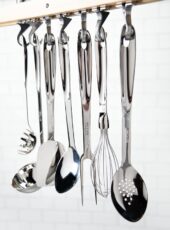Today, we want to dive into one of the most powerful tools for maintaining a healthy diet and simplifying your life: meal planning. Whether you’re new to meal planning or looking to refine your process, this guide will provide you with everything you need to get started and make meal planning a breeze.
Prepping your fruit and veggies for the week
- I always start by washing all my fruit and veggies to remove dirt, bacteria, and stubborn garden vests, it also helps remove residual pesticides and waxes. I use a natural and non-toxic fruit and vegetable wash. I then use a salad spinner to remove all the water from my fruit and veggies, this helps remove all the excess water and will help keep them staying fresh for longer. I will cut up my veggies/fruit I need for the week for snacks/cooking and store them in airtight glass containers. I often line my glass containers with paper towel to absorb any extra moisture, extending the life of my produce for the coming week.

Why Meal Planning is Important
Meal planning is more than just organizing your meals for the week; it’s a strategic approach to eating that can have profound benefits on your health, budget, and overall well-being. Here are some key reasons why meal planning is essential:
1. Promotes Healthier Eating
- Balanced Diet: By planning your meals, you can ensure that you’re incorporating a variety of foods into your diet, including plenty of fruits, vegetables, lean proteins, and whole grains. This helps you achieve a more balanced and nutritious diet.
- Portion Control: Meal planning allows you to control portion sizes, which can help with weight management and prevent overeating.
- Avoiding Unhealthy Choices: When you have a plan, you’re less likely to resort to unhealthy convenience foods or takeout, which often contain higher levels of sodium, sugar, and unhealthy fats.
2. Saves Time and Reduces Stress
- Efficient Cooking: Knowing what you’ll be cooking each day eliminates the daily decision-making process, saving you time and reducing stress. It allows you to streamline your cooking process, making meal preparation quicker and more efficient.
- Less Frequent Shopping: Meal planning helps you consolidate your grocery shopping into fewer trips, saving you time and reducing the likelihood of impulse purchases.
3. Cost Efficiency
- Budget-Friendly: By planning your meals and creating a shopping list, you can avoid buying unnecessary items and stick to your budget. This helps reduce food waste and ensures that you’re only buying what you need.
- Bulk Buying: Meal planning allows you to buy ingredients in bulk, which can be more cost-effective. This is particularly useful for staple items like grains, beans, and frozen vegetables.
4. Encourages Variety and Reduces Food Waste
- Diverse Meals: Planning your meals encourages you to try new recipes and incorporate a wider variety of foods into your diet. This prevents meal fatigue and ensures you’re getting a range of nutrients.
- Less Waste: By planning your meals and using leftovers creatively, you can significantly reduce food waste. This not only saves money but also benefits the environment.

Steps to Effective Meal Planning
1. Set Your Goals
- Determine Your Needs: Consider your dietary preferences, nutritional goals, and any specific health concerns. Are you looking to eat more plant-based meals? Do you need high-protein options? Identify what you need from your meals.
- Schedule: Look at your calendar for the upcoming week. Identify busy days when you might need quicker, easier meals, and days when you have more time to cook.
2. Gather Inspiration
- Recipes and Ideas: Browse through cookbooks, food blogs, and social media for meal ideas that excite you. Keep a collection of your favorite recipes and try to include at least one new dish each week to keep things interesting.
- Seasonal Ingredients: Focus on what’s in season. Seasonal produce is often fresher, more nutritious, and more affordable.
3. Plan Your Meals
- Weekly Overview: Write down a plan for each meal of the day (breakfast, lunch, dinner, and snacks). Be realistic about your time and energy levels.
- Balance: Ensure each meal is balanced with protein, healthy fats, carbohydrates, and plenty of vegetables.
- Variety: Mix up your meals to avoid getting bored. Try new recipes and cuisines to keep things exciting.
4. Create a Shopping List
- Ingredients: List all the ingredients you need for your planned meals. Check your pantry to avoid buying items you already have.
- Categories: Organize your list by categories (produce, dairy, grains, etc.) to make your shopping trip more efficient.
5. Prep in Advance
- Batch Cooking: Prepare larger quantities of certain meals or ingredients that can be used throughout the week. Cook grains, chop vegetables, and make dressings or sauces ahead of time.
- Storage: Use containers that keep your food fresh. Airtight glass containers, mason jars, and reusable silicone bags are great options.

Tips for Successful Meal Planning
- Start Simple: If you’re new to meal planning, start with planning just a few meals a week and gradually increase as you get more comfortable.
- Flexibility: Be flexible and willing to adjust your plan if necessary. Life happens, and sometimes plans need to change.
- Use Leftovers: Plan for leftovers by cooking extra portions. Leftovers can be a lifesaver on busy days.
- Involve the Family: Get your family involved in the planning process. This ensures everyone is happy with the meals and can help distribute the workload.
Beyond Meal Planning
1. Cooking Techniques
- Skill Development: Meal planning gives you the opportunity to focus on improving your cooking skills. Experiment with new techniques like roasting, grilling, or fermenting to enhance your culinary repertoire.
- Efficiency: Learn time-saving techniques such as using a slow cooker, pressure cooker, or instant pot. These can help you prepare meals more efficiently, especially on busy days.
2. Seasonal Eating
- Freshness and Flavor: Seasonal ingredients are often fresher and more flavorful. Incorporating seasonal produce into your meal plan can elevate the taste and nutritional value of your meals.
- Environmental Impact: Eating seasonally can reduce your carbon footprint by supporting local agriculture and reducing the need for long-distance transportation of food.
3. Mindful Eating
- Awareness: Meal planning encourages you to be more mindful of what you’re eating. Take time to enjoy your meals and appreciate the flavors and textures of your food.
- Health Benefits: Mindful eating can improve digestion and help you develop a healthier relationship with food.
Meal planning is a powerful tool that can transform your approach to eating and cooking. By dedicating a little time each week to plan your meals, you can ensure you’re eating healthier, save time and money, and reduce stress. Wild Food Journey is here to support you every step of the way with delicious recipes, helpful tips, and inspiration to keep you motivated.
Join me on this journey towards healthier eating and a more organized kitchen. Happy meal planning!
Recipes that are good for meal prep below.
Creaming Spinach, Zucchini and Chicken Pasta
This recipe is just one that’s great to meal prep ahead.

Disclosure: This post contains affiliate links. If you make a purchase through these links, I may earn a small commission at no extra cost to you. Thank you for supporting my blog!





